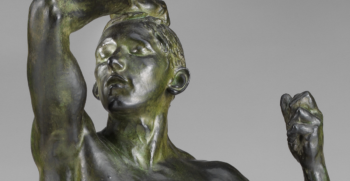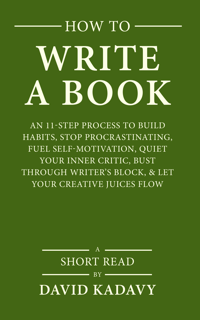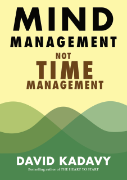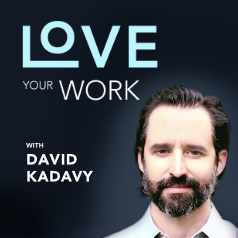Subscribe to blog updates via email »
Design for Your Dumber Self – Love Your Work, Episode 216

As I kicked and punched at the man, I glanced at the knife in his right hand. And I felt it dig into my side.

WANT TO WRITE A BOOK?
Download your FREE copy of How to Write a Book »
(for a limited time)
It all started as I crossed paths with the man. He reached in his pocket, and pulled out the knife.
I then did what surely only an idiot would do. I began to fight him.
- Listen in iTunes >>
- Download as an MP3 by right-clicking here and choosing “save as.”
- RSS feed for Love Your Work
A few seconds earlier, as the man approached me on the path, he stared at me fiercely. He charged toward me, and bared his gritting teeth. His eyes reduced to snake-eye slits, and glowed under the harsh night lamplight. He shook his head from side to side, growling.
When the man transformed from just another passerby into a mortal threat, I felt something I had never felt before, and that I haven’t felt since. A bolt of lightning rose from my stomach, to my chest. I heard a deep growl grow into a roar. An authoritative “NOOO!” It wasn’t until I heard that roar echo off the surrounding buildings that I realized — it had come from me.
It’s worth noting, I’ve never been a “tough guy.” I had never been in a fight. Yes, my older brother beat me up more times than I can count, but if someone at school threatened me, I would always meekly back down.
So as I watched myself, from outside of my own body, kicking and punching at this man with a deadly weapon in his hand, I was saying to myself, What are you thinking!?
But there was no going back. The struggle had begun, and for the first time ever, I was literally fighting for my life. Is this how I die?, I asked myself.
But the snake-eyed man suddenly didn’t look so fearless and dangerous. His eyes widened, his eyebrows soared, his mouth gaped open — its corners bending downward. I guess he thought he had picked an easy target. It turned out, he was wrong.
As the man evaded my frantic kicks and punches, an economist took over my mind. I was fighting for my life. He — was fighting for — what? An iPhone? Some money? He still hadn’t said anything, so I didn’t know for sure.
And that’s when I felt the knife dig into my side. Right between my left ribs.
Only, thankfully, it didn’t happen.
The knife was still by the man’s side — dangling from his right hand, as he repeatedly grabbed at me with his left.
I had only imagined him stabbing me. It must have been a simulation run by the economist that had taken over my mind.
And that simulation had brought the economist to this conclusion: I had way more to lose than this guy. And that was my advantage.
All I had to do was make some space, and this guy would cut his losses and move on.
But the pavement was wet. I hadn’t run more than a few paces before I slipped, head-first, down the sloping sidewalk. The flesh of my left hand was being ground off by the concrete, as I used it as my brake pad.
As I slid down the hill, I glanced over my left shoulder. I hadn’t gone far, but maybe this was enough distance to get him to give up.
But he didn’t give up. He was following me.
I still don’t know how, but I somehow got to my feet faster than he could catch me. I vaulted myself over one guardrail. I vaulted myself over another guardrail on the next path over. I scurried down a steep hill, slammed into a chain link fence, and ran like hell.
When I arrived at home, only a couple of blocks away, my hand was bleeding, my toe was bleeding, my shoes were ripped, and a button was broken off of my favorite shirt. But, I was safe.
We all know what you’re supposed to do when someone pulls a knife on you. Give them your wallet. Give them your phone. Do what they tell you to do. “Your life is more valuable than your iPhone,” people will say.
Yeah, no shit.
Just because I got away with my decision, doesn’t make it a good decision. Annie Duke would call that “resulting” — rating the quality of your decisions on the outcome, rather than, well, the quality of your decision.
You should not fight a guy who pulls a knife on you. That would be a bad decision.
Except that, you aren’t making a decision. You’re merely reacting. It’s a non-decision.
This is the error we make when we play armchair quarterback to other people’s “decisions.” “Why didn’t the cop shoot the assailant with the deadly weapon in the kneecap, instead of the chest?” “Why didn’t they just leave the room when the sexual assault began?”
We know what the ideal action would be. We don’t know shit about what it’s actually like to be in that situation.
That feeling I felt that night. That feeling I hadn’t felt before, that I haven’t felt since, and that I hope to never feel again, is a well-known phenomenon. It’s called “fight or flight.” It’s what happens when you are in a seriously dangerous situation, and your sympathetic nervous system takes over.
I didn’t stop and politely ask the man with a knife what he wanted. I didn’t then simply hand it over. “Have a nice evening!” That would have been the right “decision.” But I wasn’t making a decision. I fought, then I “flought.”
In the book Thinking, Fast and Slow, Daniel Kahneman and Amos Tversky introduce us to two different types of thinking. There’s System 1 thinking — that’s the thinking that you do in the moment. It’s “fast” thinking. Then, there’s System 2 thinking. That’s the more deliberate thinking. That’s the “slow” thinking.
Really, System 1 hardly qualifies as “thinking” at all. At least not what we normally think of as thinking. Not the “what were you thinking,” thinking. I wasn’t thinking. It was System 1.
System 1 is your dumber self. Because of System 1, we make all sorts of bad decisions. They aren’t always as bad as fighting a man with a knife. Sometimes it’s simply checking your email while you’re still in bed in the morning, or buying that scone to go with your morning coffee. If System 2 had a say in the matter, it would remind you that checking your email is a bad way to start your day, or that eating a sugary scone for breakfast is going to make you feel like crap.
The good news is that we can use System 2 to make decisions ahead of time. Before System 1 — our dumber self — has a chance to make its poor non-decision, System 2 can make sure it never even gets a chance.
Colombians have an expression. “No dar papaya.” “Don’t give papaya.” You give papaya, someone will take it.
It means don’t walk around with your cell phone out. Don’t wear a fancy watch. I’ve even heard a taxi driver use this expression when talking about someone who got robbed while in a taxi. He shouldn’t have had his cell phone out while in the taxi, the driver explained. “Don’t give papaya.”
After four years in Colombia, it’s still not clear to me at what point someone is not “giving papaya,” but instead being robbed by a criminal.
“Don’t give papaya” is what an American would call “victim blaming.” It’s a way of saying “if something bad happens to you, it’s your fault.”
Deeper than that, “don’t give papaya” is a way of convincing oneself that there’s justice in what is sometimes an unjust world — especially in a place like Colombia.
Let’s be honest here. I don’t like the expression, but the Colombians have a point. Long before my System 1 was making poor decisions, my System 2 could have made better decisions. It’s not my fault that a man pulled a knife on me, but I’m the one who cut through the park at night. I’m the one who was seduced by the temperate air to walk home, instead of taking a taxi.
Most important, I’m the one who has to live — or not live, as it could have been — with the consequences of each of those decisions. So, my fault or not, I’m going do things to prevent that from happening again.
So, since that incident, I do things differently. I try to design so that System 1 doesn’t make bad decisions. I design for my dumber self.
I took some Krav Maga classes, to help practice how I react in a panicked emotional state. I printed out paper backups of any two-factor authentication codes, so I worry less about losing my cell phone. I don’t walk through parks after dark, and I take taxis after 8pm.
I don’t only design for my dumber self to prevent the situation I was in, but other potential situations. I only take taxis from apps, where I’ll have a record of the driver and plate. I’m sure to check the plate number on the app, and make sure it matches the car I’m getting into. This policy has led to at least one screaming match with an obstinate rideshare driver in the United States.
I make decisions and policies with System 2, and I practice them. System 1 doesn’t get a chance to make a non-decision.
I also design for my dumber self in matters that aren’t life or death. Habits, routines, and the way you shape your environment with System 2 can all prevent System 1 from making bad non-decisions.
So, I deleted Twitter and Facebook from my phone. I use a newsfeed blocker on my desktop browser. I use the first hours of my day to do my most important work. Each Sunday, I plan my week ahead of time, to make sure I’m set up to address my top priorities. If I want to get some writing done, I don’t take my laptop to the cafe — I only bring my iPad, and an external keyboard.
I don’t give the papaya of my attention and focus to those who seek to juice it for all it’s worth.
I use System 2, so System 1 won’t get me in trouble. I design for my dumber self.
Image: The Age of Bronze, Auguste Rodin
My Weekly Newsletter: Love Mondays
Start off each week with a dose of inspiration to help you make it as a creative. Sign up at: kadavy.net/mondays
I've been adding lots of new content to Patreon. Join the Patreon »Join the Patreon for (new) bonus content!
Listen to the Podcast
- Listen in iTunes >>
- Download as an MP3 by right-clicking here and choosing “save as.”
- RSS feed for Love Your Work
Theme music: Dorena “At Sea”, from the album About Everything And More. By Arrangement with Deep Elm Records. Listen on Spotify »


